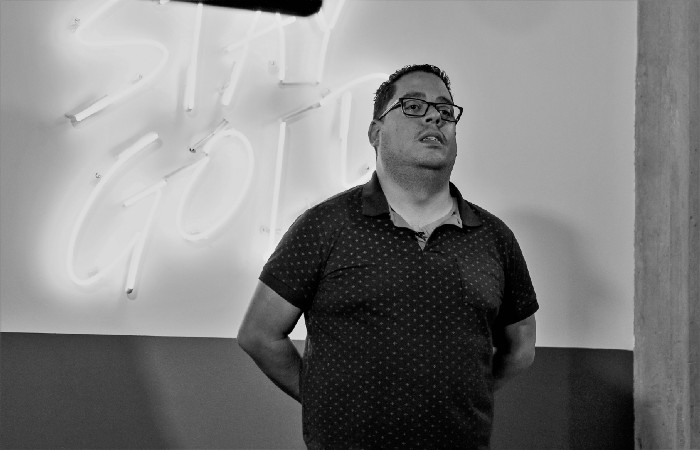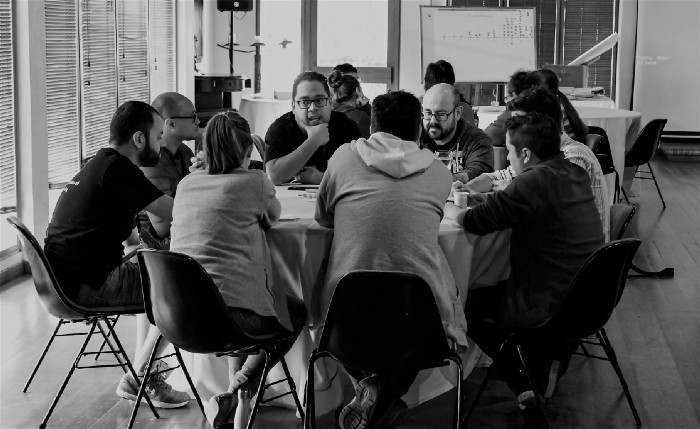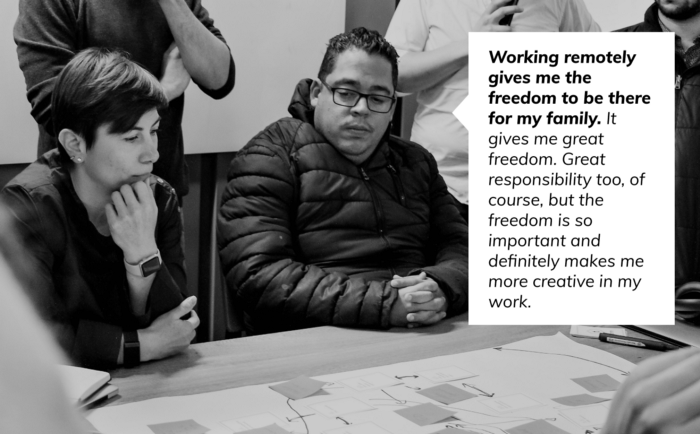The main benefit of a remote dev job? Family time.
This is part nine in a series about how we work at Bunny Studio. We’re a remote company, so we’re based all over the world. We live different lives and come from different cultures, so our ways of working are unique. This is a place where we talk about the challenges of working remotely, as well as share our experiences.
Want to learn how to work remotely? We don’t have all the answers, but here’s how each of us makes it work for us.
But if you prefer to watch a video instead, click here:
Name, job title and location?
Eduardo Echeverria. I’m a Senior Back-End Developer/Tech Lead here at Bunny Studio. I’m based in Bogotá, Colombia.

How long have you worked remotely?
Well, before I worked here, I was an entrepreneur for a while — about 9 years. I specialized in made-to-measure software for businesses. So, although I didn’t work for a remote company, in the same way, I do now, I’m used to working independently and from home.
Is Bunny Studio the first remote company you’ve worked for?
Ha, well, when I first joined Bunny Studio in March 2015 we had an office! I worked from there for about 6 months but, soon after I joined, the company transitioned into being 100% remote. So I started working from home again and haven’t looked back since.
What does a typical workday look like for you?
I have two kids, both elementary school age, so my day revolves around them as well as my work. We all wake up at around 5am, get dressed, and have breakfast. Then I take them to school at around 5:45 am. It’s an early start.
After I’ve dropped them off at school, I head back home and look over things. If there’s anything urgent or high-priority, like a bug that’s affecting our site, I deal with that first. Then I update my daily stand-up and share it with my team — this a list of things that I will be working on that day. Updating this every morning allows me and my team to stay aligned. Then, if I need to, I update the stakeholders of any projects I’m involved in — who needs to know what today?
Once that’s all done and there’s no more urgent things to take care of… I hit the gym. If I have time, you know how it is. If I do manage to work out, I’m back and at my desk by 7:30 am.
And that’s when the real workday begins. As a senior member of the team, it’s my responsibility to have control over our entire platform and its infrastructure. My team and I keep the platform working efficiently and, in order to do that, I need to be available in case anything happens. I take a break though, to pick up my kids from school and have lunch with them.
Family time is the most important thing to me and working remotely allows me to spend time with them, more than if I was working in an office. So, even though I usually finish work at around 7 or 8 pm, it’s not a hardship. I love what I do, so I don’t mind working long hours during the week. It’s not… “work” in the negative sense of the word. It’s what I enjoy. Working hard, and enjoying it, during the week also means that I have the whole weekend free to spend with my family. That’s what matters most — family time — and working remotely encourages that.

What does your workspace look like?
It’s quite plain, really. Two screens, one for my work and one for communications — Slack, Zoom, that sort of thing. That way I don’t get distracted by constant messages while I’m working. I’m still on-call, of course, but separating the work itself from work communications on different screens helps me stay focused. I also keep my headphones on all the time, in order to listen to music or take a work call seamlessly throughout the day.
Besides that, I always have coffee around — it’s the fuel that gets me through the day. I also have a lot of… little things on my desk. Like my keys or other small things that I can fiddle with if I’m working through a problem. It helps me think. I also don’t have anything in front of my workspace to distract me — it’s just a plain white wall. Colors can affect the mood, you know, and a blank space allows me to focus better on the task at hand. It’s what works best for me.
How does working remotely benefit you?
My family is the most important thing in my life, and the main reason I work from home. They are the only reason I would stop work during the day. I’m stuck to the computer most of the time, by choice, because I enjoy my work so much, but they always come first. Working remotely allows me to be with them and to look after them, whether that’s taking them to appointments, running to the bank, whatever. Working remotely gives me the freedom to do that, to be there for them. It gives me great freedom. Great responsibility too, of course, but the freedom is so important and definitely makes me more creative in my work.
What challenges do you face when working remotely?
For me, personally, there’s nothing bad about working remotely. Sure, communication can be a challenge sometimes. It’s important, especially in this line of work and in a position of leadership, to know that everyone is on the same page and understands what they have to do. Clarity is important, so I repeat myself a lot, saying the same thing in different ways until it is 100% clear to everyone. At the end of the day, that’s what will move the team and project forward — accurate communication leads to an efficient workflow.
Do you have any advice for someone who is thinking about making the change to remote work?
A remote dev job isn’t for everyone — you need to have a level of maturity and responsibility in order to succeed. And you need to be a hard worker. After all, you don’t have someone looking over your shoulder all the time, so you need to have a good level of personal responsibility. You also need to be able to look objectively at the work you produce, provide yourself with feedback, and improve independently. Your leaders will be there for you, of course, but they can’t hold your hand all the time. You need to be independent and self-sufficient.
Did your life change when you started working remotely? If so, how?
Yes, hugely! My quality of life improved so much. In the past, before having a remote job, I used to complain about not having enough hours in the day to get everything done. Commuting takes up so much time and I hated having to work set hours. But now, with software having advanced like it has, working remotely is accessible to so many more people. I mean, you don’t even need to be in the same room with someone to be able to communicate face to face.
So now, I get to prioritize what’s most important to me — my family. I get to spend my time as I want, with them and with my work, not as other people want. That’s true freedom.

Thanks so much! Anything else you’d like to add?
I think there will come a time when most jobs will be remote jobs, it’s just a matter of convincing the CEOs of the world that it’s a worthy thing. So, if you want a remote dev job, push for it. Take charge of your own work life, ask to work from home, provide evidence that backs up what you are asking for. At the end of the day, you have the power to make real change in your own life. That’s how to work remotely — do it for yourself. What are you waiting for?









